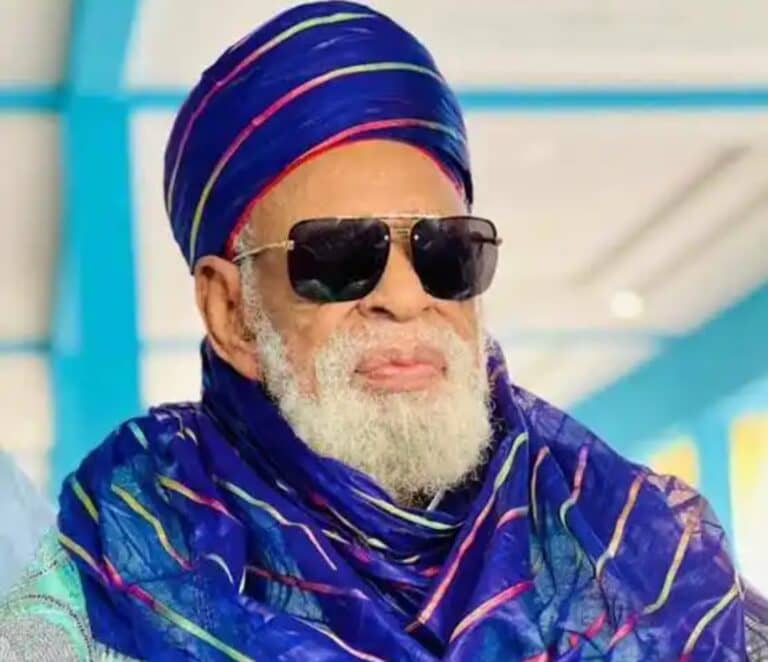BREAKING: Death of Sheikh Dahiru Usman Bauchi — A Legacy That Spans Generations
By Bala Salihu Dawakin Kudu
Democracy Newsline Newspaper
Thursday, November 27, 2025,
Nigeria — The Islamic world mourns today as word spread that Sheikh Dahiru Usman Bauchi — revered grand leader of the Tijaniyyah Sufi order in Nigeria — has passed away at the age of 98 (Gregorian) / 100 plus (Hijri calendar), following a prolonged illness.
Born on 29 June 1927, Sheikh Dahiru Bauchi committed the entire Quran to memory under the tutelage of his father, Alhaji Usman — continuing a family legacy of deep Islamic learning. Over decades, he studied under many distinguished scholars and formally embraced the Tijaniyyah tariqa, later becoming its supreme spiritual leader in Nigeria.
His teaching career began around 1948–1950, when he started giving tafsir (Qur’anic exegesis). Through the years, his voice resonated far and wide — his tafsir broadcasts aired on regional radio stations beginning in the 1970s and continued across generations.
He was not only a scholar, but also a pioneer in Islamic education and social welfare. Through his efforts:
He established more than 1,500 Quran-memorisation centres across Nigeria and other parts of Africa.
Hundreds of thousands of students became Huffaz (memorisers of the Quran) under his guidance.
He modernised Islamic schooling by integrating Quranic education with Western-style schooling: founding nursery, primary and secondary schools.
His foundation collaborated with prestigious institutions such as Al‑Azhar University, Cairo — raising a generation of teachers and scholars with robust Arabic and Islamic training.
Moreover, in his personal capacity, Sheikh Bauchi served as Deputy Chairman of the Fatwa Committee of the National Supreme Council of Islamic Affairs (NSCIA), a position through which he influenced religious discourse and jurisprudence nationwide.
Even in his final years, Sheikh Bauchi remained actively involved in education and community development. In 2025, his foundation commissioned a model Quranic nursery and primary school — a move praised as a major step toward reducing Almajiri-related begging and promoting integrated education.
Earlier this year, however, his flagship institution — the College for Quranic Science and Islamic Studies in Rafin Albasa, Bauchi State — was gutted by a devastating fire. The blaze destroyed classrooms, libraries, laboratories, and important facilities, though, by grace, no casualties were reported. Despite the blow, the foundation vowed restoration, reflecting the Sheikh’s long-standing resilience and dedication to rebuilding even in adversity.
Confirmation of his passing came from close disciples and associates early on Thursday morning. One disciple, identifying as Daha Azhary Bauchi, announced: “Innaa lillahi wa innaa ilaihi raji’un… Maulana Sheikh Dahiru Usman Bauchi has passed away (Wafaty). May Allah bless us with his blessings.”
The exact funeral arrangements are awaited, but already, believers and followers across Nigeria, and far beyond, are preparing to pay their respects — acknowledging that with his death, a towering light of Islamic scholarship and spirituality has dimmed on earth.
A scholarly institution: tens of thousands of Huffaz, countless Islamic teachers and scholars, thousands of memorisation centres — his imprint on Islamic education is deep and enduring.
Bridging faith and modern education: Through combined Quranic and Western-style schooling, he promoted a model where religious grounding and contemporary education go hand in hand.
Spiritual leadership: As leader of Tijaniyyah in Nigeria, his teachings — rooted in love, piety, remembrance of Allah, and adherence to the Quran — shaped moral and spiritual lives across generations.
Social welfare and community support: From building houses and providing free accommodation to students and disciples, to offering support for marriages and family needs, his compassion extended beyond scholarship to real-life upliftment.
In a world often fragmented by discord, he stood for unity, compassion, knowledge, and spirituality. His life was more than dates and titles — it was a living message: that devotion to faith, humble service, and commitment to education can transform lives and shape societies.
As the Muslim community prepares to honour him in death, may his students, family, followers and the wider Ummah draw strength from his example. And may his legacy continue to shine through the generations — through the recitations of the Quran, the teachings of his students, the walls of his schools, and the hearts of believers everywhere.











